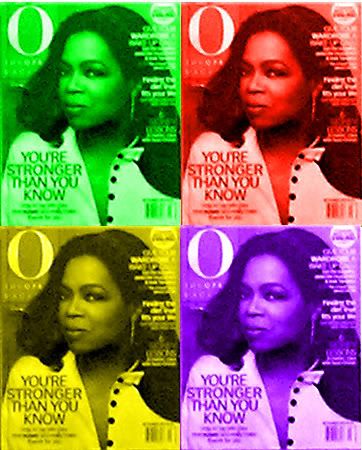 |
"flatter," more of a silk screened rather
than photoshoped, version of this poster
Kitty Kelley's Oprah book is a measured, non-hysterical account of Oprah's life. I have never read any of Kelley's unauthorized biographies before, and always associated her with gossipy, unfounded stories. I don't think that's the case with Oprah’s. In fact, she seems quite mild and generous towards her.
But, still, a sad truth prevails throughout the biography. Contemporary America (and the world too) embraced Oprah fully. But, when searching for something substantial, all we get is sensation. Even her "dangerous" moments like her New Agey "The Secret," where one wills positive outcomes and they simply occur, are taken for Oprah's more kooky moments.
She never shook any foundations. For example, she hasn't done anything extraordinary with her money. In fact Kelley writes that Oprah's charities do not reflect her financial worth – which is her way of saying that Oprah is somewhat stingy. Her one major project of opening a girls academy in South Africa is a failure.
Everyone from presidents to ordinary viewers who enter the Oprah zone resort to teary confessions of past victimhood, but a few tears on T.V. don’t harm anyone. And I would think that once away from Oprah’s blunt questions (I can imagine that’s how women in their "girls night out" interrogate each other), people resume normal lives.
It was a revelation to me that she is simply an insubstantial sensation. One of her last words in Kitty Kelley’s book is where she says, "I wanted [President Obama] elected, and I think I did that." This is a woman who thinks (and who everyone thinks) wields more power than she does. In fact, when her show did influence the election of G.W. Bush, it was the adroit Bush who got the better of her and sent a positive message to her audience. The forces do not revolve around Oprah.
Oprah leaves her daytime show for her new network the Oprah Winfrey Network (OWN – Oprah is always ready to focus on her "girl power") next year. I think she’ll simply be relegated to a respected, but somewhat obscure, chapter of American cultural history. I honestly don’t think people will remember her into the next century (or generation) other than the apparent sensation she caused: "What did she do?" people will ask. Well, she hosted a paradoxically big but inconsequential "first black woman's" talk show. She has no followers, unlike the old guards like Johnny Carson or Bob Hope. She strangely works alone and independently, in a cocoon of her own making. Even Barbara Walters has more gravitas and influence.
In another entry, I will try and elaborate on why Oprah became such a worldwide phenomenon. I think it is an interesting and complex cultural story, which involves her just as much as her audience. I am inclined to believe that she needed her audience more than they needed her, and in another sad turn of her life's events, they used her more than she used them.
